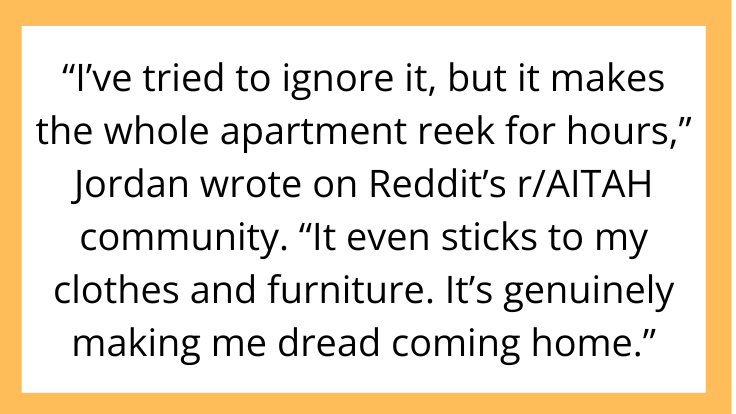AITAH for Asking My Roommate to Stop Cooking Fish Because I Can’t Stand the Smell?
Living with roommates is a rite of passage for many adults. It can be fun, cost-effective, and even lead to lifelong friendships. But sometimes, cohabiting means dealing with the not-so-pleasant quirks of others. In today’s AITAH scenario, one user found themselves nose-deep in tension—literally—over a very fishy issue.
Let’s dive into what happened, why it matters, and whether asking someone to change their habits at home makes you the villain.
The Situation: One Apartment, Two Very Different Noses

The original poster (let’s call them Jordan) lives with a roommate named Leo in a small two-bedroom apartment. For the most part, things are fine. They split rent evenly, respect each other’s space, and get along decently.
But there’s one problem: Leo loves to cook fish.
And not just occasionally. We’re talking baked salmon, pan-fried tilapia, tuna casseroles—almost every other day. The smell, Jordan says, is unbearable.
“I’ve tried to ignore it, but it makes the whole apartment reek for hours,” Jordan wrote on Reddit’s r/AITAH community. “It even sticks to my clothes and furniture. It’s genuinely making me dread coming home.”
Eventually, Jordan asked Leo to either cut back on cooking fish or find a way to minimize the smell. That’s when things got heated.
The Fallout: “It’s My Home Too”

Leo wasn’t pleased. He argued that cooking fish is part of his diet and lifestyle, and that he pays rent just like Jordan. “You can’t police what I eat in my own home,” he told Jordan.
He did try using the kitchen fan more often, and opened a window here and there—but to Jordan, that wasn’t enough. The tension between them has grown, and now Leo says Jordan is being “unreasonable and controlling.”
Jordan turned to Reddit with one question: AITAH for asking my roommate to stop cooking fish because I hate the smell?
The Internet Reacts: A Divided Verdict

As usual, the r/AITAH community was quick to dissect the issue. Responses were mixed, with empathy on both sides.
Team Jordan: Smell Sensitivity Is Real
-
Shared spaces require compromise: One top comment read, “You’re not wrong for bringing it up. When you live with someone, you both have to make adjustments.”
-
Scent can be overwhelming: People pointed out that not everyone can tolerate strong food smells—some even get headaches or nausea.
-
Frequency matters: Cooking fish once a week might be tolerable—but every other day is pushing it in a shared space.
Team Leo: Let People Live
-
Paying rent = equal rights: Several users argued that Leo has a right to cook whatever he wants in his own home.
-
Cooking at home is healthier and cheaper: For many people, especially with dietary needs or cultural ties to certain foods, home cooking isn’t optional.
-
There are limits to roommate rules: Some pointed out that unless a rule was established before moving in, you can’t suddenly impose new ones mid-lease.
A Bigger Issue: Communication and Compromise

This story is less about fish and more about shared expectations. The real problem? Jordan and Leo didn’t set clear boundaries or lifestyle agreements before becoming roommates.
This is incredibly common. People often move in together without discussing:
-
Cooking habits
-
Cleanliness standards
-
Noise levels
-
Overnight guests
-
Scent sensitivity
In Jordan’s case, the issue could potentially be solved with a few compromises:
-
Leo could agree to cook fish less frequently or try less pungent recipes
-
Use of an air purifier or stronger ventilation system
-
Jordan could invest in odor-absorbing sprays or charcoal bags
-
Setting designated “fish nights” and open communication around it
But if both parties refuse to budge? It may be a sign they’re not compatible as roommates long-term.
Who’s the Villain Here?

So, is Jordan the villain for asking Leo to stop cooking fish?
Not necessarily. Bringing up a discomfort and asking for compromise isn’t inherently wrong. In fact, it’s essential in shared living situations.
But demanding a roommate eliminate a food entirely—especially one tied to culture, health, or preference—can come off as controlling if not approached delicately.
Leo also isn’t the villain for wanting to cook what he enjoys. But refusing to acknowledge how it affects someone else in a shared space isn’t fair either.
This is one of those classic “no one’s truly wrong” situations—but poor communication is absolutely to blame.
Takeaway: Living Together Means Meeting in the Middle

Roommate life is built on shared responsibility, patience, and flexibility. If something bothers you, say something—but be ready to listen too. Just because something seems small to you (like a smell) doesn’t mean it’s not a big deal to someone else.
The real trick is how you navigate these moments. Approach issues with empathy, not ultimatums, and you’ll be far more likely to find common ground.



